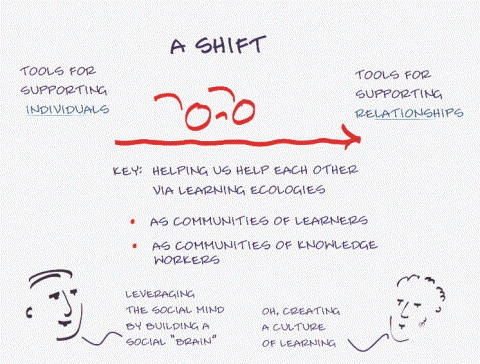May 17, 2017 - 11:47
by John Seely Brown, 1999
 Based on a tape transcription of a talk at the 1999 Conference on Higher Education of the American Association for Higher Education, John Seely Brown's remarks which pre-date Google, Facebook, Twitter, MOOCs, smart phones, and the Internet of Things are relevant almost 20 years later. How are we doing at creating a "learning ecology" both in our culture as a whole and in our smaller communities?
Based on a tape transcription of a talk at the 1999 Conference on Higher Education of the American Association for Higher Education, John Seely Brown's remarks which pre-date Google, Facebook, Twitter, MOOCs, smart phones, and the Internet of Things are relevant almost 20 years later. How are we doing at creating a "learning ecology" both in our culture as a whole and in our smaller communities?
"[T]he Web does three things. First, the Web helps to establish a culture that honors the fluid boundaries between the production and consumption of knowledge, recognizing that knowledge can get produced wherever serious problems are being attacked and followed to their root. Second, with the Web, it is easier for experts—in the academy or in the firm—to casually interact with others and thus to act as mentors or advisors for students (or knowledge consumers) of any age—that is, folks that want to learn. Third, the Web provides infinite reach, rendering accessible resources far beyond the region; yet, the power of this reach is greatly enhanced when the results of this reach act as cross pollination, providing new grist, new points of view for communities of practice of the region.
In essence the Web augments the knowledge dynamics of a region, increasing its diversity and expanding its learning resources by leveraging local expertise—in a lightweight way—for mentoring. More generally, it enhances the fluid boundaries between knowledge production and knowledge consumption and between the local and the virtual. The Web helps to build a rich fabric that combines the small efforts of the many with the large efforts of the few. It enables the culture and sensibilities of the region to evolve, not only by enriching the diversity of available information and expertise, but it tightens the feedback loops of bootstrapping. It increases the intellectual density of cross linkages. And it enables learning to happen everywhere—a learning ecology. And the lurking (or informal benchmarking) that happens in local hangouts can now get augmented by the Web, one feeding the other. In other words, a self-catalytic system starts to emerge reinforcing and extending the core competencies of the region.
Let me end with a brief reflection on a very profound shift that I believe is happening—a shift between using technology to support the individual and using technology to support relationships. This shift will be very important because with it we will discover new ways, new tools and new social protocols for helping us help each other, which is really the very essence of social learning. It is also the essence of lifelong learning, a form of learning that learning ecologies could dramatically facilitate."
